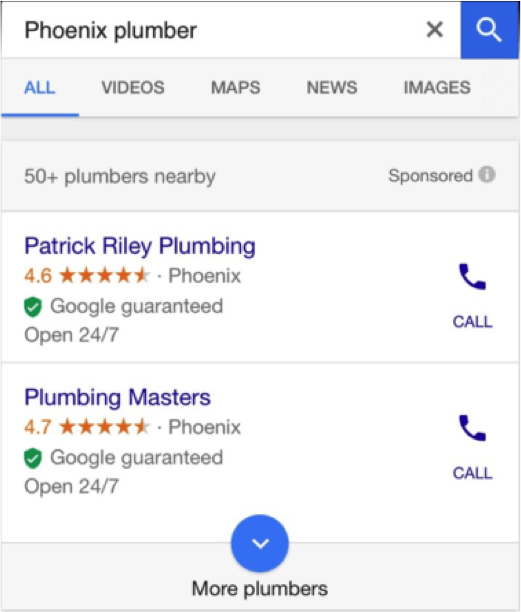Interested in Business?
Get Business articles, news and videos right in your inbox! Sign up now.
Business + Get AlertsIf you’ve been paying attention to your online presence and search engine optimization efforts, you already know that pay to play is the future. Yes, having a well-optimized, mobile-friendly website is still important, but paid ads now dominate the top half of search results, pushing sites that rank organically further and further down the page.
Because we market service businesses online, we’ve been carefully watching this trend, and we weren’t all that surprised when Google launched Google Home Services (now known as Google Local Services) back in 2015. Although Google plans to roll this pay-to-play program out in more cities and more industries over time, it has already rolled out to the plumbing industry in nearly 20 cities across the nation. That means you need to know about it now. Here are some of the basics.
What is Google Local Services?
Google Local Services is an advertising program that home service and local service businesses can sign up for. Application involves a background check of either the owner or manager of the business, as well as background checks of any and all employees who serve customers in their homes, and the verification of required state and local licenses and general liability insurance.
If you’re accepted into Google Local Services, you become a “Google guaranteed” business. That means Google will “vouch” for your business and will cover claims up to the job invoice amount (with a lifetime cap of $2,000) if the customer is dissatisfied with your work. There are exclusions to that coverage, such as any add-on or future projects (services not booked through Local Services), any damage to property, any dissatisfaction with price or responsiveness, any cancellations, and any claims submitted more than 30 days after service completion.
Currently, Google Local Services is available in:
- Phoenix
- Los Angeles
- Riverside, California
- Sacramento, California
- San Diego
- San Francisco
- San Jose, California
- Miami
- Atlanta
- Chicago
- Boston
- Detroit
- New York City
- Philadelphia
- Dallas
- Seattle
- Washington, D.C.
While some cities may include additional service categories, the service categories currently included in all 17 cities are: locksmiths, plumbers, electricians, HVAC, and garage door services.
How Does Google Local Services Work?
Businesses enrolled in Google Local Services are given a business profile page and promoted to the top of search results when someone searches for that business’ services. Potential customers are shown ads with the business name, review score, location, hours, Google guaranteed badge, and an option for calling or clicking to message the business. When a potential lead takes action, the business receives an email and a notification within the app. Then, it’s up to the business to manage and close that lead.
Here’s what the Google Local Services ads look like on a desktop computer:
And here’s what they look like on a mobile device:
If searchers click “More plumbers in Philadelphia” on the desktop example or “More plumbers” on the mobile example, they are taken to a separate page where all of the area’s Google guaranteed plumbers are shown.
How Are Leads Tracked and Managed?
Business owners can accept bookings, respond to customer questions and messages, manage leads, track conversions, manage budget, and turn ads on or off as needed, all from within the Google Local Services app.
What Qualifies as a Lead, and How Are You Charged?
With Google Local Services, you’re charged per lead. Unlike normal bidding in AdWords, each lead is priced by Google based on the job type, the area, and what they know “about cost of jobs and overall demand.”
Texts, emails, voicemails, and calls from potential customers are all considered leads. If you miss a call and return a call (speaking with the customer or leaving them a voicemail) or respond with a text or email, this is also considered a lead.
Google provides conditions for what qualifies as a valid lead and what doesn’t, which is designed to safeguard business owners and prevent them from paying for solicitations, spam calls, leads outside of their service area, and leads looking for services the business doesn’t offer. If you think you’re charged for an invalid lead, you can dispute it, but not all disputes will be credited.
Payment works like this: You set an average weekly budget (which is determined by how many leads you’d like to receive each week), and your ad is shown until your lead budget is spent. If you spend more than your average weekly budget, it just comes out of your monthly budget, so you can’t go over your monthly spend at any point. If this does somehow happen, Google will credit you for any leads received after reaching your monthly max in ad spend.
How Is Ranking of Ads Determined?
Google isn’t notorious for transparency, and they aren’t giving all of the secrets away here either. What we know is that where your ad ranks has something to do with your ratings and reviews, your responsiveness to leads, and your location, to name a few. In fact, if you don’t respond quickly (or at all) to lead messages that come in through Google Local Services, they may remove the “message” feature altogether for your ad and rank your business lower.
What Are the Benefits?
According to Google, the benefits of becoming a Google guaranteed business are:
- Presence at the very top of Google.
- The ability to connect with your customers at the moment they’re searching for you and most likely to act.
- A personalized profile and an app where your communications, budget, and tracking tools can be easily viewed and managed.
- Immediate consumer trust (because of the Google guarantee).
- You only pay for “verified” leads.
- Leads choose you (in order to become a lead, they have to select your business).
Kim Spalding writes on the Google blog:
“When people need a plumber or a locksmith, they search online for a business nearby. With Local Services by Google, businesses like yours can show up at the top of Search, so that you can reach local clients right when they’re interested, and book more jobs.”
Why Is Google Doing This?
The first reason is that Google is concerned about the quality of search results and they’re looking for ways to eliminate or at least significantly cut down on spam. Guess who’s notorious for using black-hat tricks and techniques to scam their way to the top of Google search results? Service area businesses. More from Google:
“All Google guaranteed businesses that appear in Local Services are background checked and display a badge of trust, which limits deceptive advertisers, elicits trust among users, and highlights quality businesses.”
The second reason is that Google is a business and there’s money to be had in the local and home services industries. By inserting itself between the customer and the company, Google can expect to get a slice of that money pie.
What Are Some Potential Concerns/Things to Consider?
While it may make sense for you to apply to become a Google guaranteed business in your local area, the platform is still relatively new and there’s still a lot we don’t know. Here are some questions you may want to consider as you determine whether or not Google Local Service ads are something you should invest in:
- Do you want Google to act as a liaison between you and your customers?
- Do you want Google determining what a qualified lead is?
- What happens if Google gets more than one complaint or repeat negative feedback on your business? How does that affect price or ranking?
- Are the leads coming from Google Local Services quality, loyal leads or price-driven leads?
- Will being a Google guaranteed business help you if all of your competitors are also enrolled?
- Home service projects and repairs can get expensive. What happens once the lifetime value covered under the Google guarantee ($2,000) is met?
If you’re already a Google guaranteed business, let us know what your experience has been by commenting below.
About the Authors
Taylor Hill and Carter Harkins are the co-hosts of the "Blue Collar Proud (BCP) Show," a podcast that’s all about having and living the blue-collar dream, and co-authors of the book Blue Collar Proud: 10 Principles for Building a Kickass Business You Love. Hill and Harkins also co-founded Spark Marketer, a Nashville-based digital marketing company that works primarily with service businesses. They regularly speak at service industry trade shows and conferences across the nation, aiming to change the perception of blue-collar work and serve those who serve the world. Visit www.bcpshow.com.







